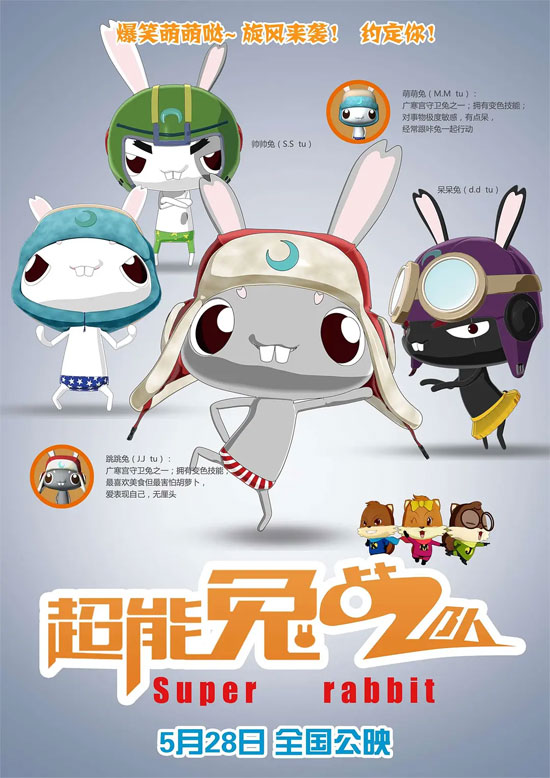Film Name: 超能兔战队 / Rabbit Hero

My attitude toward this film skyrockets by the end, reaching a 5 out of 10—a significant jump from the 2 I’d give it for most of its runtime. The character “Herbal Tea Wei” discovers the final ingredient in the secret recipe for the ultimate herbal tea: heart. While it’s hard to prove the film’s production itself was made with “heart,” this element does manage to elevate it slightly.
In truth, the film’s greatest revelation to me lies in how to execute product placement. I watched the entire film without realizing product placements existed—such extraordinary integration! Unlike the blatant placements in “Happy Little Submarine Magic Box of Time” (Tudou.com), “The Grow 2” (Dream Cube), or even the Toyota billboards in “Stand by Me Doraemon,” this film employs a unique approach that makes placements imperceptible while leaving a profound impact. That approach is constant, pervasive integration.
Several rabbits coincidentally land at an herbal tea shop on Earth, making herbal tea a recurring theme throughout. A pivotal and brilliant supporting character, “Herbal Tea Wei,” emerges with this memorable name. He not only inherits the shop but also dedicates himself to developing the ultimate herbal tea recipe for future generations. So when he finally grasped the concept of “heartfelt dedication” and created “Deng Lao Herbal Tea” (at this point, I had no idea such a brand existed—perhaps because I’d grown numb to hearing about Jiadabao and Wanglaoji), I naively assumed it was the name of the new herbal tea concocted by the characters. It wasn’t until the end credits that I realized Old Man Deng’s Herbal Tea was actually a film sponsor. Wow, this product placement was truly earth-shattering. From start to finish, it relentlessly implanted the herbal tea concept, going to great lengths to highlight the brand value of “heartfelt dedication.” In the end, this herbal tea even became the ultimate weapon to cool down the villainous male lead. It truly made audiences remember the four characters “Old Man Deng’s Herbal Tea” without any sense of incongruity.
Now consider another example: Habby Bear. The film’s very first shot features a bear commander leading a troop of cubs that frequently fill the entire frame—a visual spectacle reminiscent of the Minions dominating every scene in Despicable Me. Having never encountered this bear before, I felt no sense of strangeness; it was simply an adorable little bear named Habby. Later, it becomes the film’s main antagonist, remaining central throughout, and ultimately wins the affection of Chang’e, the moon goddess. After 80 minutes of exposure, this bear—somewhat pale in color and not particularly distinctive in shape—gradually formed an impression in my mind. As its identity shifted from villain to hero, its image in my mind grew richer. When the end credits rolled, wow—there it was: the “Habi Bear” brand prominently listed. Suddenly, a vague memory surfaced. Maybe I had seen Habi Bears in real life or in the news before, but I hadn’t really noticed what they looked like. Now, I remembered them clearly and vividly.
Of course, if I hadn’t tried Three Squirrels’ dried fruits, I might not have realized the product placement nature of the Three Squirrels Battle Squad.
The power of full-film integration is immense. When an ad appears abruptly, even if the placement is perfectly appropriate, people will notice. But when an ad is seamlessly woven into the plot, making you feel like the story was written specifically for it, you lose your guard.
So whether the film features a rabbit squad or a bird squad becomes irrelevant, and whether the characters are superpowered or low-powered matters little—because the film’s advertising value has already been realized, and its costs recouped. The film pours all its effort into making the product placement feel organic. The vividness, completeness, and humor of the subplot about “Liang Chawei” making herbal tea significantly outshine the main storyline of the super-powered rabbits battling the Habi Bears. To such an extent that the film shouldn’t even be called “Super Rabbit Squad”—it should be renamed “The Legend of the Herbal Tea Heroes.” In terms of visual quality and verbal violence, this film ranks among the worst domestic animations in recent years. Pixelation-induced mosaics even appear on the big screen, while profanities like “bastard” and “idiot” are thrown around so frequently they become unbearable to watch and listen to.
So, is such a cleverly product-placed, cost-recovering animated film worthy of encouragement? I say absolutely not!
Please specify:Anime Phone Cases » Rabbit Hero 2015 Animation Film Review: Habi Bear drinks Uncle Deng’s herbal tea.